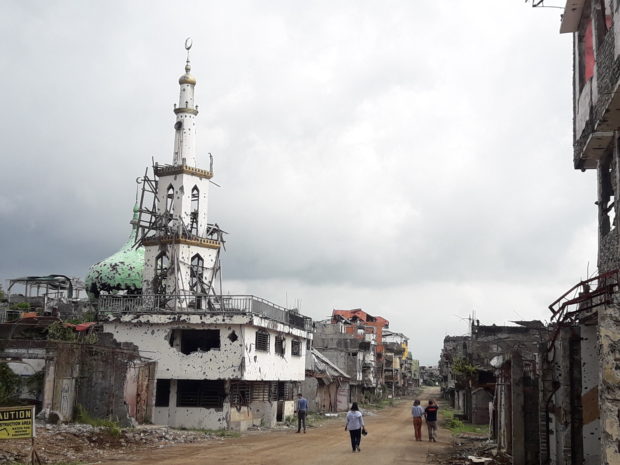
DELAY The rehabilitation of Marawi City has yet to be completed three years after the siege. —DIVINA SUSON
CAGAYAN DE ORO CITY, Misamis Oriental, Philippines — Displaced people in Marawi City on Tuesday disputed President Rodrigo Duterte’s claim that there had been no human rights violations during the more than two years of martial law in Mindanao.
“Uprooting some 100,000 of us ‘bakwet’ (evacuees) from Marawi for almost three years now is a big violation of our human rights,” said Drieza Lininding, chair of the Moro Consensus Group.
“Depriving us of access to our own properties is a human rights violation,” he said, referring to Proclamation No. 216 which Mr. Duterte issued in May 2017 when sections of Marawi fell into the hands of Islamic State (IS)-influenced militants.
Disheartened
“What Mr. Duterte said in his State of the Nation Address (Sona) was a big lie,” said Amirah Lidasan, national chair of Suara Bangsamoro.“The Moro people will never forget the destruction and looting of their homes and properties. They are still disheartened by the destruction of their mosques, ancestral homes, and other religious and ancestral sites. No one was held accountable for the destruction,” Lidasan said.In the Sona, Mr. Duterte said there was no human rights violation when he placed the entire Mindanao under martial law from May to July 2017 and extended it three times up to December 2019.
Lininding said human rights violations, including looting in the city’s abandoned houses, disappearances and torture, were recorded during the time.
“How many times did you extend martial law to instill fear among the people, to stop them from filing a case and eventually to forget?” Lininding said in a social media post.
Documented
In its May 2020 report, the United Nations High Commissioner for Refugees (UNHCR) placed the number of displaced people at 126,775 three years after the conflict. These people are still living in transitory shelters or community-based evacuation centers, according to the UNHCR.
Lininding said human rights groups were not allowed to enter Marawi and investigate the supposed violations.“But that will not be erased in history, that’s being documented,” he said.
Citing UN data in 2017, Lidasan said five months of military airstrikes and ground operations against the IS-inspired Maute Group and Abu Sayyaf had reduced the once bustling Islamic city into rubble, displacing between 78,466 and 90,000 families at the height of the conflict.
No word on BARMM
“More than a hundred died, their bodies still either to be identified or missing,” she said. “No one was held accountable for those who died, for those who were buried but were not identified, for the missing, for victims of illegal arrest and detention, torture, for those exposed to indiscriminate firing during five months of military airstrike,” Lidasan said.Some people in the Bangsamoro said they were disappointed when Mr. Duterte did not say a word on the Bangsamoro Autonomous Region in Muslim Mindanao (BARMM) and the rehabilitation of Marawi.“That means he (Mr. Duterte) has no concern for BARMM,” Mohagher Iqbal, the region’s education minister, said.
“I was waiting for the President to say something—like an ultimatum—for the Marawi rehabilitation. It has been a long time since our brothers who were displaced have been trying to bear the situation,” said Basilan Rep. Mujiv Hataman.
But Hataman urged his colleagues in Congress to “serve as bridges for peace and to take Mr. Duterte’s call for unity seriously.”
Both Sowing the Seeds of Peace in Mindanao and Balay Mindanaw Foundation Inc. (BMFI) said they were disappointed that Mr. Duterte failed to say something about the peace process, particularly the stalled talks between the government and communist rebels.
“[There was] nothing about the peace process but more on his fear of engaging in war with China,” Charlito Manlupig, BMFI founder and president, said, adding that “not a single line about Bangsamoro. Mindanao [was] mentioned only once, but in relation to martial law.”
—With a report from Melvin Gascon